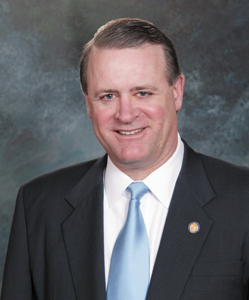STRAIGHT FROM THE SENATE
 SENATE’S PLAN ALLOWS COUNTIES, VOTERS TO DECIDE REORGANIZATIONS by State Sen. David Long
SENATE’S PLAN ALLOWS COUNTIES, VOTERS TO DECIDE REORGANIZATIONS by State Sen. David Long
(STATEHOUSE) – According to the National Association of Counties, Indiana is the only state in the nation that divides fiscal and legislative policy-making decisions between two groups – boards of commissioners and county councils.
Other states with county-level governments unify these roles under a county executive or single board.
Indiana senators voted recently to allow each county to decide if budgeting and policy making should be unified in hopes of providing more effective, efficient and accountable local government.
Senate Bill 506 resulted from the property tax crisis faced by Hoosiers in recent years. State figures showed Indiana’s county governments spent $2.2 billion in property taxes in 2007.
All taxes are a function of government spending. Indiana’s property taxes are used to fund schools and local government. In 2007 and 2008, Indiana faced a property tax crisis that saw homeowners’ bills double and even triple. These high property taxes placed many Hoosier homeowners – especially senior citizens and young couples – in danger of having to sell their homes.
Because many Hoosiers faced such life-changing decisions… and because Indiana faced a property tax crisis… a blue-ribbon panel, the Kernan-Shepard Commission, was named to research and recommend a more efficient and more accountable system of local government.
Senate Bill 506 allows each county’s board of commissioners or voters to decide whether or not to unify budgeting and policy making. Counties with populations greater than 400,000—Lake and Marion—are excluded from the legislation, because their structures already vary from others statewide.
Under the bill, county commissioners would choose among a single elected county executive, a combined board of supervisors or a referendum by voters. Voters could subsequently choose between a board of supervisors or stay with the current form of government.
An elected county executive follows the model used by federal and state government and is common among more than 700 counties in 29 states nationwide.
A board of supervisors would combine the roles of commissioners and councils, provide for district and at-large representation, and establish a credentialed, full-time manager who would be hired by the board to run the county on a day-to-day basis. It follows a model used in 47 other states.
This bill also formalizes a state Office of Local Technical Assistance to promote and coordinate sound fiscal, management and operational practices among units of local governments and state agencies. These functions are currently performed by the Indiana Office of Management and Budget.
Senate Bill 506 supports home rule, avoids a one-size-fits-all mentality, and creates mechanisms for unifying fiscal and other policy making decisions. The bill will promote more clarity for citizens, more choices and representation for voters, more accountability and efficiency for taxpayers and more collaboration and cooperation between elected officials.
The bill’s fate now rests with the Indiana House of Representatives.
Sen. David Long (R-Fort Wayne) is President Pro Tem of the Indiana Senate. He serves District 16, which includes portions of Fort Wayne.
- Celebrating 20 Years Of Community At The Stand - April 12, 2024
- First Positive Case Of Chronic Wasting Disease In Indiana - April 12, 2024
- Southwest Allen County Schools Embark On Major Tree Plantings - April 12, 2024


